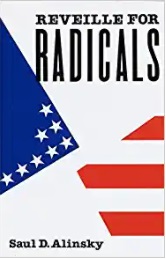 |
|
 |
|
 |
 |
 |
 |
 |
 |
 |
 |
 |
 |
| 2020 Election: | Joe Biden's book | Cory Booker's book | Pete Buttigieg's book | Kamala Harris' book | Bernie Sanders' book | Donald Trump's book | 2018 Senate Debates |
Reveille for Radicals by Saul Alinsky  (Click for Amazon book review)
OnTheIssues.org BOOK REVIEW: This pair of books -- Rules for Radicals and Reveille for Radicals -- comprised the "progressive catechism" of my political enlightenment, in the early 2000s in Boston. You'd read the pair of books, and if you were just a regular liberal Democrat, you'd conclude "Those goals are ok but not those tactics." You could officially declare yourself a progressive activist if you read them and said "Let's get started." Or more likely, "This is what I've always done," because regular liberals investigated methods while progressive activists took action. So I'll outline here how we differentiated between liberals and progressives, which is indicative of the ongoing split in the party between liberal Democrats and progressive Democrats. In 2003, after the Robert Reich Massachusetts gubernatorial campaign, volunteers got together to found "The Progressive Democrats of Cambridge" (PDC) and "The Progressive Democrats of Somerville" (PDS), with the intent to work within the Massachusetts Democratic Party to advance progressive policy. PDC and PDS invented the "Mass Scorecard," which compared each state legislator (who were often centrist or conservative) to the state party platform (which has always been very progressive) – for the purpose of running progressives to challenge centrists in Democratic primaries. The Mass Scorecard gave a letter grade to each legislator, "A" through "F", based on a couple dozen legislative votes -- and we got the 2005 Massachusetts Democratic Party Convention to officially endorse it (the convention is attended by progressives, but run by the party regulars). The Democratic party regulars (who are liberals or centrists, not progressives) didn't like the Mass Scorecard one bit -- so they threatened to sue us. Massachusetts General Law has a rule that organizations can only use the term "Democrat" with the authorization of the Massachusetts Democratic Party (it's in the criminal code known as "MGL 56.40"), and they made it clear they would never "authorize" us! We countered that we looked forward to a Boston Globe headline "Mass Democrats sue Progressive Democrats to stop calling themselves 'Democrats'." They left us alone, and I have proudly called myself a "Progressive Democrat" ever since. Those are the tactics that Alinsky advocates, and those same tactics are what party regulars dislike. As Alinsky describes, "Every issue involving power and its use has always carried in its wake the liberal backwash of agreement with the objective but disagreement with the tactics" (p. 22). Alinsky differentiates the difference in mindset as: "Liberals dream dreams; [progressives] build the world of men's dreams" (p 23). That difference in mindset is what activists call "agency." Liberals might envision a new policy and sigh about the prospect of its long-in-the-future implementation. Progressives instead act as agents of change, to implement those policies right here and right now. Liberals complain that progressives are "radical" (that's the term Alinsky uses) because we want changes now, and are willing to do what is necessary now, rather than wait for some unspecified future when the time is more ripe (which is what liberals want). An example of "agency": Around that same time, Vermont Governor Howard Dean offered himself as the progressive candidate for president. So we decided to start a grassroots organization, "MassForDean", which would serve as a statewide PAC for popularizing the Dean campaign. At an early "Meetup" at a pub, a liberal lawyer in attendance interjected "but we're not authorized by the Dean campaign to start a statewide grassroots PAC." So I grabbed a pub napkin, and wrote on it, "I hereby authorize the founding of MassForDean; signed Jesse Gordon." That was all we ever had for "authorization" for more than a year-long campaign during which we became one of the largest grassroots PACs. And that's what Alinsky writes about in this book -- radicals authorize themselves; then decide on their own what action to take; and implement that action without further authorization. Alinsky writes on this topic, "Radicals precipitate the social crisis by action--by using power. Liberals may then timidly follow along, or else, as in most cases, be swept forward along the course set by radicals, because of forces unloosed by radical action" (p. 22). Or more succinctly, "Liberals ask for change and radicals fight for change." (p. 25) This book was first written in 1946, but progressives still apply its lessons. Alinsky wrote the preface and Afterword in 1969 (which OnTheIssues also excerpts -- the ones with Roman numeral page numbers and those above p. 205). Then Rules for Radicals was written in 1971. Both Hillary Clinton and Barack Obama cited Saul Alinsky as an important influence, by which they meant this pair of books. My progressive groups considered Alinsky's rules current for the early 2000s, and we still consider this book current today. -- Jesse Gordon, editor, OnTheIssues.org, June, 2021
| |||||||||||||||||||||||||||||||||||||||||||
| |||||||||||||||||||||||||||||||||||||||||||
Page last edited: Nov 25, 2021